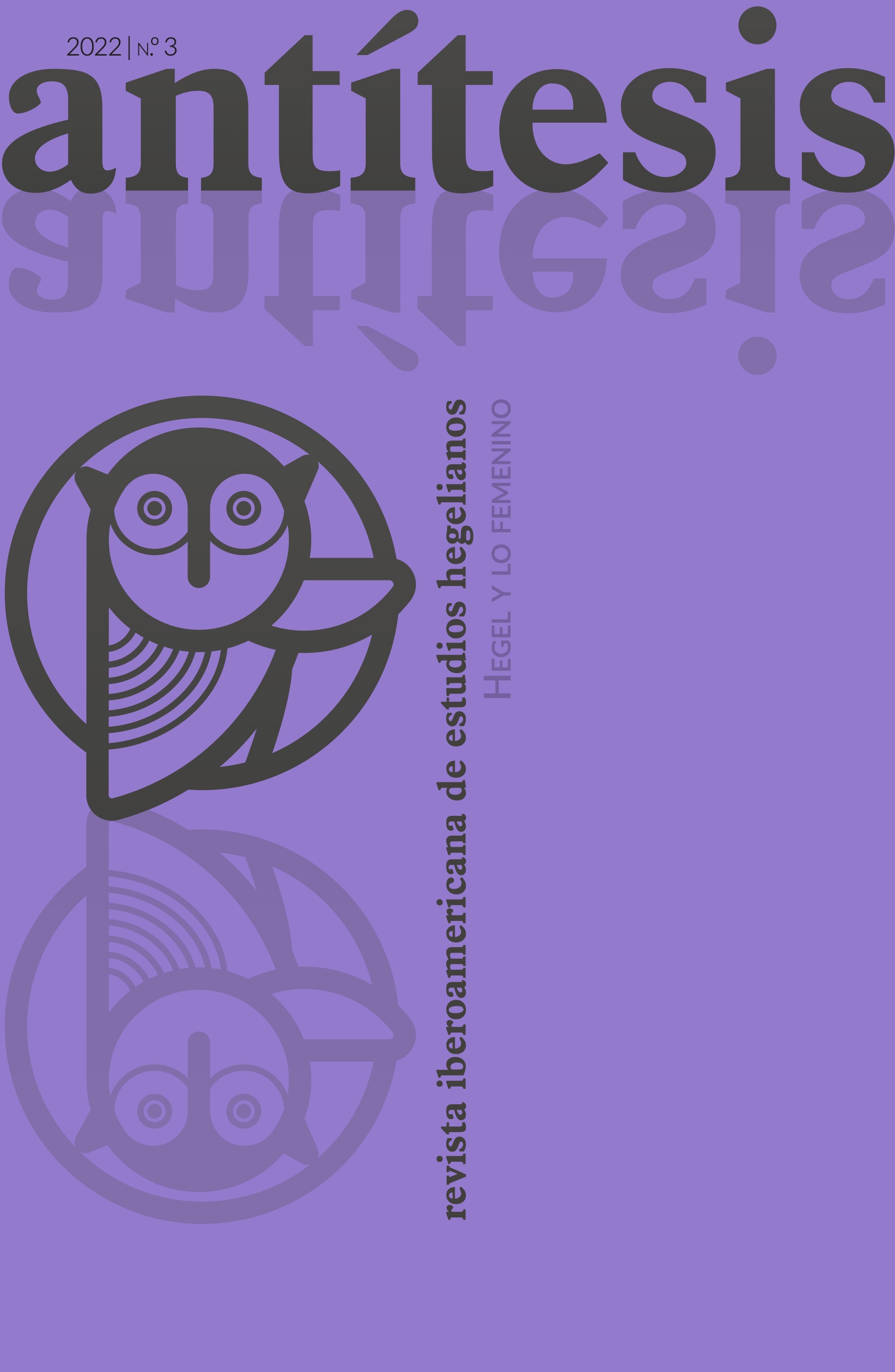Keywords:
Hegelianism, deconstruction, Glas, Antigone, familyCopyright (c) 2022 Ramón Mistral

This work is licensed under a Creative Commons Attribution 4.0 International License.
Abstract
Abstract: Of all the possible answers to the question “What is the relation of Hegel's philosophy to the feminine?”, Jacques Derrida’s is surely one of the strangest imaginable: it is, he says, a relation of identity. According to Derrida, the supersession movement that organises Hegel’s System —the Aufhebung— is feminine, and this in the very sense that Hegel gives to femininity. The interpretation of Hegelianism underlying this response is at the heart of Glas —a strange, difficult, and little-studied book— or at least of the text’s left column, devoted, as it is well known, to Hegel's family. In these pages I intend to reconstruct Derrida’s interpretation, to elucidate its limits and thus to shed some light on the question of the role of women in Hegel’s philosophy. Keywords: Hegelianism, deconstruction, Glas, Antigone, family.
Downloads
References
BEARDSWORTH, R., Derrida & the political, Routledge, London, New York, 1996.
COHEN-HALIMI, M., Stridence spéculative: Adorno, Lyotard, Derrida, Payot, Paris, 2014.
CRITCHLEY, S., «A Commentary Upon Derrida’s Reading of Hegel in Glas», Bulle- tin of the Hegel Society of Great Britain, 9, 2, 1988, pp. 6-32, http://dx.doi.org/10.1017/ S0263523200002482
DERRIDA, J., De la grammatologie, Éditions de Minuit, Paris, 1967. ––––, L’écriture et la différence, Éditions du Seuil, Paris, 1967.
––––, Marges de la philosophie, Éditions de Minuit, Paris, 1972. ––––, La dissémination, Éditions du Seuil, Paris, 1972.
––––, Positions, Éditions de Minuit, Paris, 1972.
––––, Glas, Galilée, Paris, 1974.
––––, Clamor, La Oficina, Madrid, 2015.
––––, Le problème de la genèse dans la philosophie de Husserl, Presses Universitaires de France, Pa- ris, 1990.
––––, Spectres de Marx, Galilée, Paris, 1993.
––––, Politiques de l’amitié, Galilée, Paris, 1994.
HEGEL, G.W.F., Werke in zwanzig Bänden, Suhrkamp, Frankurt am Main, 1986.
––––, Die Vernunft in der Geschichte, Vol. I de Vorlesungen über die Philosophie der Weltgeschichte. Fe- lix Meiner, Hamburg, 1955.
––––, Fenomenología del espíritu, Abada, Madrid, 2010.
––––, Fenomenología del espíritu, Pre-textos, Valencia, 2015.
––––, Lecciones sobre la estética, Akal, Madrid, 1989.
––––, Filosofía de la religión. Últimas lecciones, Trotta, 2018.
––––, El joven Hegel. Ensayos y esbozos, FCE, Madrid, 2014.
HYPPOLITE, J., Genèse et structure de la phénoménologie de l’esprit de Hegel, Aubier-Montaigne, Pa- ris, 1946.
KERVÉGAN, J.-F., «Figures du droit dans la Phénoménologie de l’Esprit», Revue internatio- nale de philosophie, n° 240, 2, 2007, pp. 193-214. https://doi.org/10.3917/rip.240.0193
KOJÈVE, A., Introduction à la lecture de Hegel : leçons sur la Phénoménologie de l’esprit, Gallimard, Paris, 1947.
LYOTARD, J.-F., «Discussions, ou: phraser “après Auschwitz”» en LACOUE-LABARTHE, Ph., y. NANCY, J.-L., (éd.), Les Fins de l’homme à partir du travail de Jacques Derrida : colloque de Cerisy, 23 juillet-2 août 1980, Galilée, Paris, 1981.
MÍGUEZ BARCIELA, A., El llanto y la polis, La Oficina, Madrid, 2019.
RAMOND, C., «Derrida-Hegel dans Glas (le dégel)», en Colloque Les interprétations de Hegel au
XXème siècle, 27-30 sept 2006, s. l., 2006, https://halshs.archives-ouvertes.fr/halshs-00923405 ROGOZINSKI, J., Cryptes de Derrida, Fécamp, Lignes, 2014.
STEINER, G., Antígonas, Gedisa, Barcelona, 1987.
